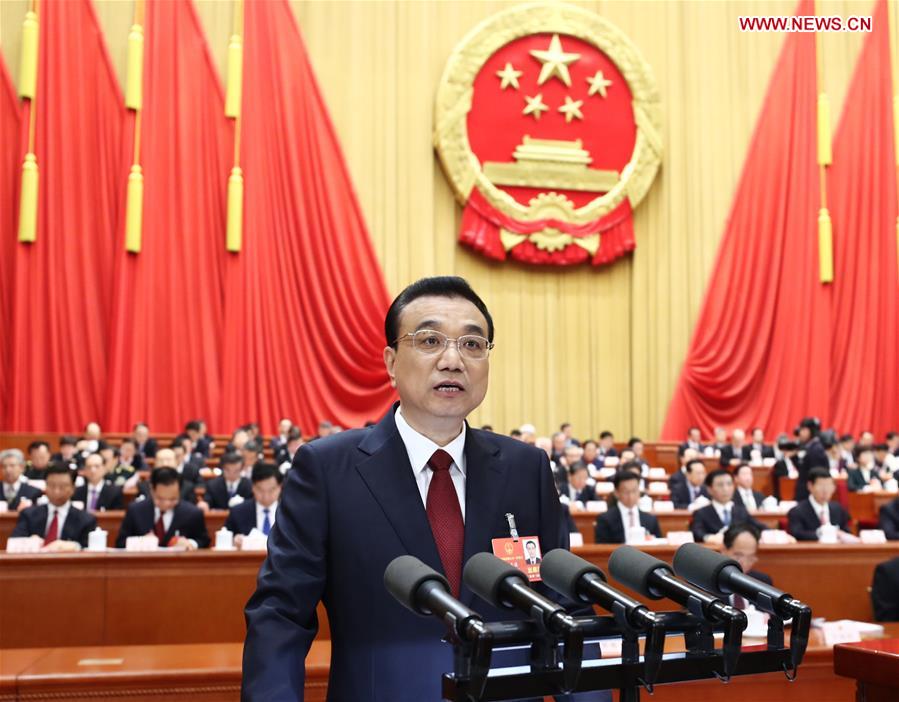
Chinese Premier Li Keqiang delivers a government work report at the opening meeting of the first session of the 13th National People's Congress at the Great Hall of the People in Beijing, capital of China, March 5, 2018. (Xinhua/Ju Peng)
BEIJING, March 5 (Xinhua) -- China will reduce the poor rural population by over 10 million in 2018, including 2.8 million people to be relocated from inhospitable areas, Premier Li Keqiang said Monday.
"Poverty alleviation efforts will be carried on through the development of local industries, education, and healthcare," Li said when delivering a government work report at the first session of the 13th National People's Congress (NPC), the national legislature.
China will do more to support areas affected by extreme poverty, and the central budget's newly enlarged poverty reduction funds and related transfer payments will be weighted toward these areas.
Li said that China would tailor measures to individuals and individual households to ensure that targeted poor populations, including elderly people, people with disabilities, and people with serious diseases, receive the assistance they need.
"Poverty relief policies will remain unchanged for those already lifted out of poverty, while the battle goes on, and the newly poor and those who slip back into poverty will receive prompt support," he said.
The premier promised targeted measures against corruption and misconduct in poverty alleviation.
"China will continue to apply the current poverty alleviation standards and ensure that poverty reduction progresses as planned and meets all standards," he said.
More than 68.5 million rural people had been lifted out of poverty in China over the past five years. That means 37,000 people escaped poverty every single day. The national poverty rate falling from 10.2 percent to 3.1 percent.
Ximeng County in southwest China's Yunnan Province used to be a national-level poor region. Inspired by the country's targeted poverty alleviation drive, the county has developed cattle farming and tourism over the past five years, bringing poverty rate drastically down.
"People have moved from their shabby thatched or wooden houses to new apartments," said Yang Yu, Party chief of the county.
Zuo Xiangyun, an NPC deputy from east China's Jiangxi Province, said Shenshan Village, his hometown, had developed yellow peach and tea plantations, as well as rural tourism.
"Tourists to the village increased from 100,000 in 2016 to nearly 220,000 last year. Thanks to this change, our incomes also grew," Zuo said,
Zuo also said to consolidate poverty alleviation, infrastructure should be improved and a proper industrial development plan must be in place.
China has made great leaps in reducing poverty and reaching the benchmarks laid out in the Sustainable Development Goals, according to the United Nations Development Programme.
William Jones, Washington bureau chief of the Executive Intelligence Review news magazine, said ending poverty had long been regarded a major task for humanity, but until recently was seen as a "utopian dream."
"With China, that dream is now becoming a reality," he said.
"China's remarkable progress in reducing extreme poverty has significantly contributed to the decline in global poverty," noted Hoon S. Soh, World Bank program leader for economic policy for China.
According to a draft report from the Ministry of Finance released Monday, the central government will allocate over 106 billion yuan (16.7 billion U.S. dollars) to subsidize poverty reduction, an increase of 20 billion yuan, or 23.2 percent over last year.
Additional funds will mainly be used in areas affected by extreme poverty, mostly in western China.
"Bringing another 10 million people out of poverty will be much harder this year and requires the government to roll out more precise and tailored measures," said Wang Sangui, a professor with Renmin University.